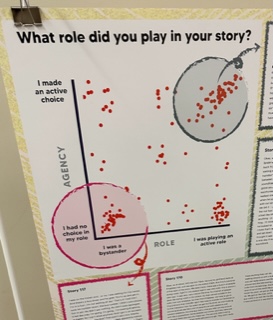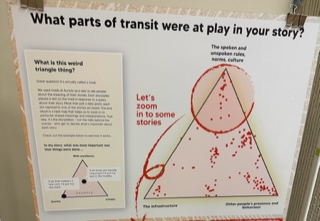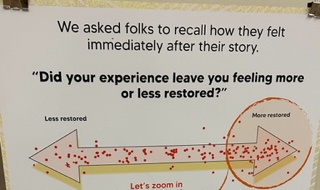A Prototype Wellbeing Project and An Interview With Those on the Ground Level

interview by Ani Heslop
Knowsy Fest is a prototype project that, according to the organizing group, Auricle, attempts to explore “how the people around you are really doing”, by gathering stories and data from regular people, like you or me.
In 2021, Knowsy Fest took to Edmonton streets to discover Edmontonians’ wellbeing after the pandemic. After skipping 2022, this year, in 2023, eight Local ‘Listeners’ went to the Edmonton Transit System to talk to people about how transit affects their lives and connections and to gather their stories.
As a transit user myself, I was so curious to see what this prototype project was all about. I took the train to the Churchill station to talk to some Local Listeners about their findings.
My interview with Paula Kirman and Nathaniel Smith-Keller – two of the eight Local Listeners – gives insight as to what it was like on the ground level gathering these stories.
Ani: “Was it tricky trying to get people to talk with you and to share these intimate experiences?”
Paula: “We found that it worked a lot better when we interacted in a way where we were showing care towards the other person, especially when we were at LRT stations, where we were able to offer something to eat or drink when they’re hungry… It helps people relax and want to talk to us. We tried a few times where we just went out there cold and up to people and tried to explain who we are and what we were doing, and people weren’t as interested. When we had something to offer, it really made a difference.
“We ended up developing community and developing relationships with people that hung out in the [Jasper Place] transit station. Week after week they would come back, and ask about people who were there. We were there for Knowsy fest yesterday and some of them showed up. It’s more than taking people’s stories, we’re building relationships by becoming a consistent presence there.”
Nathaniel: “We were doing a photo booth and giving out timbits. We’ll just man coffee stations, and people loved that, the incentive of food and drink really gets people talking, it makes them comfortable. One of the biggest things is creating that space. We got a bunch of pillows for the chairs, and tapestries in the transit station, kind of masking over the blandness. The drabness affects you, it makes you feel drab, and then you don’t want to talk, and people aren’t comfortable.”
Ani: “Did the aspect of anonymity help the participants at all?”
Paula: “Consent was a huge part of it. We were using an app to collect the stories, and the very first thing is consent. Consent that their stories would not be changed or edited in any way, and they were given the option of it being transcribed as text, or if we could use their voices. It was a double consent. Most people were ok with both, some didn’t want their voice.”
Nathaniel: “Anonymity gave some people comfort. Dealing in some distressed areas, people were paranoid to share because of their involvement with [illicit substances and other people], and were worried to actually talk about it.
“It was eye opening in a way. Some people were really closed off. One lady was really rude to me when I asked if she had a story. She said like, two sentences, and then Paula asked if she gave me a story. I told her that she gave me a lowdown, and the lady was like, ‘I gave you a story! You know my story now!’ All I knew is that she was having a really, really hard time and didn’t want to talk about it. It was easier for some people with the anonymous aspect. But if people didn’t want to talk, they didn’t and you can’t force them to.”



Ani: “Seeing what you have displayed here [the posters above] looks really neat and tidy. What was it like on the ground level? Was there a more chaotic energy while trying to gather these stories?”
Paula: “To go through the process of recording their story, and the different questions about their wellbeing and the demographic, it takes a bit of time, and we’re at a busy transit station, so sometimes we get cut off part way through because people need to go get their bus, and some people were interested in talking to us but just didn’t have the time. But we had brochures that had the QR code on them, so if people wanted to go to the Auricle website and record the rest of their story and answer the questions on their own time.”
Nathaniel: “Sometimes we’d show up and everyone is having a bad week, nobody wants to talk, and other weeks, there’s a higher energy and are more interested in the conversation.”
Ani: “The class I’m writing this piece for is called ‘Cultural Journalism.’ How do you think Knowsy Fest, and the transit system as a whole, affects the culture of Edmonton?”
Paula: “Public transit is very important to the culture of the city. The thing about collecting stories about transit, and wellbeing, and the connection between those, gives people in decision making positions a different perspective on transit. We hear a lot of people complaining about safety issues, but we don’t hear about it presented as a story, and with all the additional information that we collect along with the story to put it into perspective: how did it actually affect them? And their well being?… It will hopefully give policy makers a different perspective about what transit means in Edmonton, and how to make it a better city.”
Nathaniel: “For me, it’s the ability to get involved to change the policies, and get the information on the ground level so we can actually do something… the people who make the policies don’t take transit, so we want perspectives of the people who actually do take transit. It’s building connections, that’s the whole thing: bringing people together. Giving people something to look forward to, and a chance to share their story. What we’re trying to do is analyse where things can get better, how people are connected, and what they’re experiencing. We’re looking at both sides of the extreme, and then bringing things back to the centre. Getting less complaints about transit would be great!”
Several issues arise with this prototype project that I could see. First of all, the ‘data’ they collect is largely non-scientific, and non-quantitative. The graphs and charts they present are directly correlated to the stories gathered, not to countable or measurable data that one expects to see when hearing the word ‘data.’
Second, it’s no secret that Edmonton’s less fortunate population congregates around transit stations because of the warmth and community that they provide. In my interview, Paula and Nathaniel told how they offered incentives, such as coffee and snacks. They also created relationships with some of these people. This, however, could skew the ‘data,’ as it would not be a survey of representative Edmonton residents on Transit, but more of Edmonton’s homeless residents on Transit. Don’t get me wrong, these stories are still incredibly important! POC stories are impactful and necessary, but that was not the purpose of this survey.
Lastly, the parameters of this survey aren’t clear. The Local Listeners gathered almost 200 stories, but there’s no data on the age, gender, or socioeconomic status of the story-tellers; at least not yet. Keep an eye on Auricle.info for more substantial information and maybe even some much-needed quantitative date on what was gathered during this experiment.
Knowsy Fest is a prototype: it’s not perfect, and it’s not supposed to be perfect. It’s an experiment, and experiments have problems. I don’t think that the issues pertaining to the lack of quantitative data is a deal breaker for this to be an effective project. Some of the stories that the Local Listeners gathered were extremely powerful to me. There was one story a man told where he fell asleep on a bus after a long shift at work. When he awoke after three rotations of the route, all of his belongings were stolen. Another story that impacted me was someone who was running after a bus that was leaving the station, and the storyteller was running, yelling, “please, please!” The bus miraculously stopped and let them on, the bus driver saying he only did because they said please. As a transit user myself, I’ve missed many buses and I’ve even cried at transit centres for missing a bus or train.
Transit is so important to the culture of Edmonton, and despite the problems with this prototype project, seeing the stories of other transit users made me feel less alone.
Knowsy Fest 2023
website

